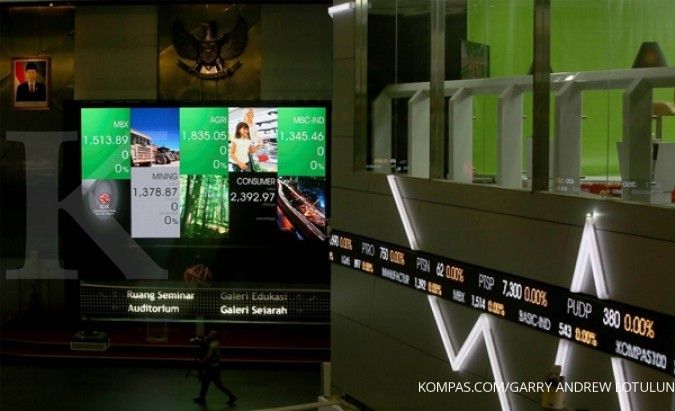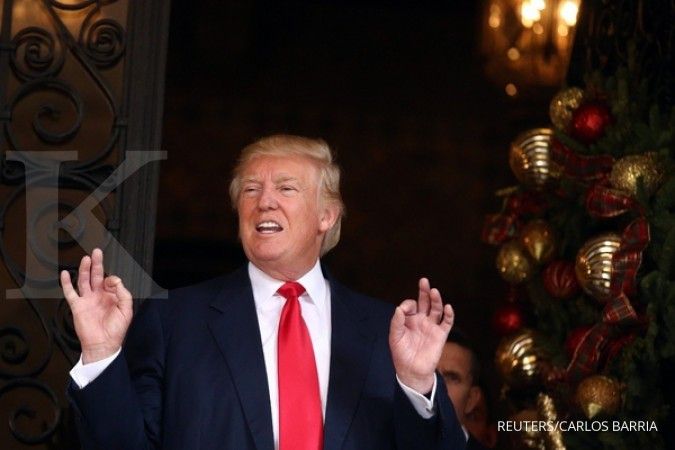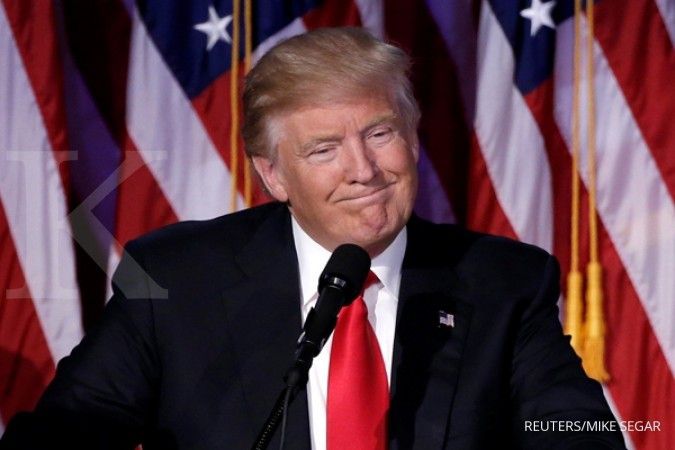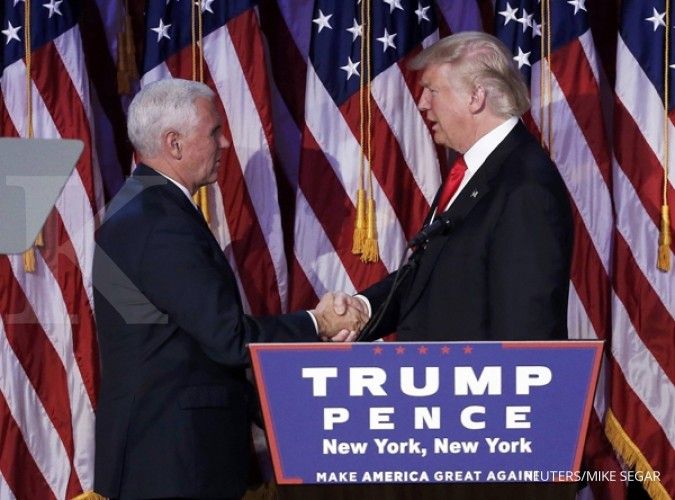DURING his campaign period, Trump offered many controversial programs. Trump will focus more on domestic policies, such as protective economic policy. This has led to anxious in global trade.
Aside of the protection, Trump will cut tax for middle income class, as well as reduce tax for corporate from 35% to 15%. Trump also offers tax holiday to attract American investors to repatriate their funds.
However, on the other hand, this billionaire from Republic Party promises to spend government’s infrastructure spending in a massive manner. This is potentially to enlarge the deficit. The policy also leads to unease in emerging markets, on the grounds that Trump apparently will invite the investors to shift their funds from emerging markets to smoothen his way to realize his programs.
Trump’s policies may change global economic map. Therefore, Indonesia should anticipate Trump’s future policies.
According to Director of Macro Planning and Statistic Analysis at Ministry of National Development Planning Amalia Adininggar Widyasanti, some simulations have been conducted to examine future impacts of Trump’s policies. The results are surprising: the US, as well as global economic will slow down. “This includes Indonesia. Indonesia’s economic growth in 2017 can be 0.14% lower than the baseline,” she said.
Is Indonesia ready? As of the third week of January 2017, the government has not yet conducted special analysis to anticipate Trump’s policies. Presidential spokesman Johan Budi admitted that the presidential office has not yet decided special agenda to discuss about this matter. However, the government will always monitor global economic development, including the impacts of Trump’s statements and policies.
Minister of Finance Sri Mulyani said that the combination of expansive fiscal policies and protection will bring negative impacts to global economic. Indeed, Indonesia has also to anticipate the US’ monetary policy.
According to Amalia, aside of monitoring, Indonesia will prepare some policies related to investment climate to anticipate Trump’s policies. The policies have to be able to attract investors to sustain their investments in Indonesia.
The government should also maintain the stabilities in terms of macro economy, inflation rate, and foreign exchange rate. “We need to sustain public’ purchasing power to strengthen domestic economy,” Amalia said.
Economist at Samuel Aset Manajemen (SAM) Lana Soelistianingsih said that the US apparently will cover its fiscal expansion with debts. As information, the US is the largest debt market in the world. In other words, the US seems to absorb massive amount of the global funds, while Indonesia also needs to make debts to generate funds. Therefore, the government needs to prepare appropriate strategy to issue government bonds in order to prevent investors to shift their funds to buy the US’ government bonds.
“I believe that Ministry of Finance has prepared to issue the bonds,” Lana said. The government seems to issue the bonds in the first semester so as not to coincide with the implementation of Trump’s policies.
The new US president will boost the fiscal expansion in 2018. The budget period of the US will start on 1 October and will terminate on 30 September of the subsequent year. In other words, until 30 September 2017 Trump will still use the State Budget, which was arranged by Obama’s government.
Therefore, the government needs to make debts during quarter I-quarter III before Trump starting the budget period.
Risk buffers
In the recent year, the government has tradition to issue the bonds in the early semesters, as tax revenues would have just been collected ahead of the end of year. Therefore, the government will usually prepare to make debt at the beginning of year. Under 2017 State Budget, the government sets to issue government securities with a total gross of Rp 579 trillion.
The government securities issuance aims at covering 2017 State Budget deficit, which will be 2.41% of Gross Domestic Product (GDP).
The government is planning to issue as much as 60.15% of the total gross of government securities in the semester I. This strategy may reduce the competition with the US in making debt.
Recently, BI is making some efforts to recover domestic economy amid uncertainties in global financial market. During the meeting of Board of Governors of BI in the last week, BI decided to maintain BI 7-day Reverse Repo Rate at the level of 4.75%, as well as to sustain deposit facility and lending facility at the levels of 4.00% and 5.50%, respectively. This policy has started taking effect since 20 January 2017.
“We consider the US and China’s policies as the global risks to watch out in this year,” said Executive Director of BI Tirta Segara. Therefore, BI will optimize the combination of monetary, macro prudential, and payment system policies. This strategy aims at maintaining macro economy and financial system stabilities.
The government may launch another strategy to stifle the risks of global economic threat, namely Economic Policies Package. Since the end of 2015, the government has issued up to 14 packages to anticipate the economic slowdown. Amalia is optimistic that the future economic policies package may stifle the threat of Trump’s policies. The policies package may include licensing and investment incentives to build investors’ confidence.
However, Economist at Bank Permata Josua Pardede said that the implementation of the policies packages have not yet been optimum. Therefore, related institutions need to formulate appropriate strategies to cope with the issues on the policies’ implementation, such as policy clash between the institutions. A more concrete policies implementation is essential to convince the investors that policy deregulation and structural reform are running well.
At a certain level, tax amnesty program may reduce the potential risks of Trump’s policies. In this case, the repatriation funds of tax amnesty should be allocated to infrastructure sector. According to the reports of 21 gateway banks, the repatriation funds of tax amnesty as per 31 December 2016 just reached Rp 121.1 trillion of targeted Rp 141 trillion.
The government also should allocate the funds to the real sectors so that the funds may create multiplier effect. “The government and state owned enterprises have to increase the investment by evenly realizing the projects along this year. The funds should not be deposited in the banks,” Amalia said. Based on the estimation of National Development Planning Agency (Bappenas), the projects will bring positive contributions to domestic economy if they are realized as early as possible.
Amalia is optimistic that even if Trump completely implements his policies, the impacts to domestic economy will no more than minus 0.4% if the government realizes those strategies.
(Muhammad Farid/Translator)
/2017/01/21/1154782176p.jpg)













